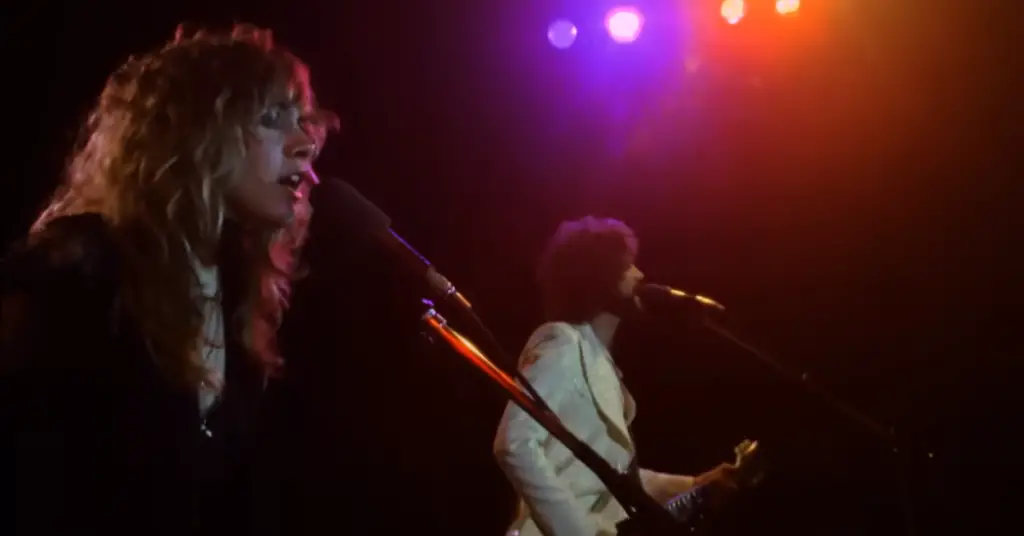Fleetwood Mac – “Don’t Stop”: A Pop-Rock Promise of Brighter Days Ahead
When Fleetwood Mac released “Don’t Stop” in 1977 as the third single from their masterpiece album Rumours, it instantly became a hopeful anthem for uncertain times. With its upbeat piano groove, sunny harmonies, and unmistakable message of perseverance, “Don’t Stop” stood apart from the rest of the album’s raw emotional confessions—not by ignoring pain, but by choosing to look past it.
Written by Christine McVie in the middle of personal heartbreak, the song wasn’t just a catchy pop track. It was a mantra, a form of self-therapy, and ultimately a gift to millions of listeners who would find strength in its simple but powerful message:
“Don’t stop thinking about tomorrow / Don’t stop, it’ll soon be here…”
The Sound: Piano-Driven Positivity with a Polished Punch
Musically, “Don’t Stop” rides on Christine McVie’s bouncy piano rhythm, layered with John McVie’s steady bass line and a shuffling, feel-good beat from Mick Fleetwood. The track blends elements of pop, rock, and Americana, but its true power lies in its energy and optimism.
The vocals are shared between Christine McVie and Lindsey Buckingham, whose contrasting tones—her warm and assured, his bright and urgent—create a dynamic push and pull that mirrors the song’s central theme: moving forward, even when it’s hard.
Add in Fleetwood Mac’s trademark tight harmonies and some crisp, driving guitar work, and you’ve got a track that manages to be both soothing and energizing.
The Lyrics: Optimism Born from Heartache
At face value, “Don’t Stop” is an inspirational tune. But its backstory adds a whole new layer of meaning. Christine McVie wrote it during her breakup with bassist John McVie, and the lyrics were directed—however gently—at him.
“Why not think about times to come / And not about the things that you’ve done?”
Rather than wallow in sadness, McVie takes the high road. The message is clear: The past hurts, but the future still holds promise. It’s incredibly human—offering comfort not by denying the pain, but by reminding us it doesn’t last forever.
It’s this balance of emotional honesty and optimism that has helped the song resonate far beyond its original context.
Chart Success and Cultural Impact
“Don’t Stop” reached #3 on the Billboard Hot 100, becoming one of the biggest hits from Rumours, an album that has since sold over 40 million copies worldwide.
Beyond the charts, the song took on a second life in the political arena when Bill Clinton adopted it as his 1992 campaign anthem. He even convinced Fleetwood Mac to reunite and perform it at his inaugural ball—a powerful moment that helped reintroduce the band to a new generation.
It’s also appeared in movies, commercials, sports events, and countless feel-good playlists. The reason? It’s unshakably infectious and universally relevant.
Legacy: A Light That Keeps Shining
More than four decades after its release, “Don’t Stop” still feels fresh and vital. It’s the kind of song that plays just as easily during a morning jog as it does during a moment of personal crisis. Its simplicity is its strength—a reminder that forward is always an option, no matter how heavy yesterday may have been.
Christine McVie’s legacy as one of rock’s most elegant and emotionally grounded songwriters shines brightest here. She gave the world a song that offers a hand up, not just a hand out—and in doing so, left behind a message that’s as needed today as it was in 1977.

Final Thoughts
Fleetwood Mac’s “Don’t Stop” isn’t just a feel-good song. It’s a musical life raft. It understands heartache and answers it with hope. It doesn’t promise perfection—it promises progress.
So if you’re stuck in the past,
If the weight of yesterday won’t let go—
Just press play.
And don’t stop.


Facebook Comments